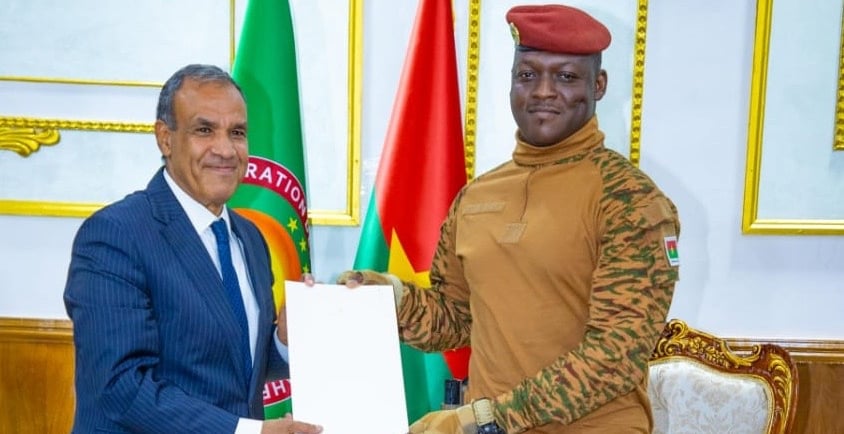A Strategic Pivot: How Egypt is Redefining its Role in West Africa
Kawthar Ahmed, Political Science Researcher
8/16/20253 min read


Amid the turbulent currents of global change, Egypt is making a decisive move to reclaim its historical role as a leader on the African continent. This is not a return to old rhetoric, but a sophisticated, modern strategy grounded in pragmatic partnership. The recent high-stakes tour of six West African nations by Foreign Minister Badr Abdelatty was not just a diplomatic courtesy call; it was a statement of intent.
Accompanied by a high-level delegation of government officials and private sector titans, the tour signaled a paradigm shift in Egyptian foreign policy: moving from symbolic solidarity to building tangible alliances based on mutual interests in security, trade, and development. This is how Egypt is actively forging a new chapter in its African relationships.
More Than Handshakes: The Four Pillars of Egypt's New Africa Strategy
The tour was a meticulously planned diplomatic offensive built on four interconnected pillars, showcasing a multifaceted approach to regional engagement.
1. Political Power and Diplomatic Clout
The core mission was to strengthen political ties and reaffirm Egypt's role as a stabilizing force. Minister Abdelatty delivered personal letters from President Abdel Fattah El-Sisi to the leaders of Burkina Faso and Mali, countries navigating complex political transitions. This direct, high-level engagement was designed to activate political consultation, coordinate positions within the African Union, and solidify Egypt's presence in the critical Sahel region.
2. Economic Partnerships in Action
This tour was about business. Joint business forums were launched in Nigeria and Burkina Faso, with a delegation of over 30 leading Egyptian companies exploring new markets. This wasn't just talk; it yielded immediate results, including a significant agricultural Memorandum of Understanding signed in Nigeria. By showcasing the capabilities of Egyptian giants like Arab Contractors, Orascom, and El Sewedy Electric, the tour built credibility and paved the way for concrete investment.
3. Security Cooperation and Counter-Terrorism
With the Sahel facing a persistent threat from extremist groups, Egypt positioned itself as a steadfast security partner. The tour included firm commitments to expand training programs in counter-terrorism, policing, and border control through the Egyptian Agency of Partnership for Development. Discussions focused on practical cooperation, including intelligence sharing, to help West African nations build the capacity to tackle their own security challenges.
4. Cultural Diplomacy and Global Influence
Beyond politics and security, the tour aimed to bolster Egypt's soft power. A key diplomatic victory was securing formal endorsements from Nigeria and Burkina Faso for Dr. Khaled El-Anany’s candidacy for Director-General of UNESCO. This success demonstrates Egypt's ability to leverage its deep cultural heritage and modern expertise in education and healthcare to win support on the international stage.
The Ripple Effect: Immediate Wins and Long-Term Gains
The tour generated both immediate successes and long-term strategic advantages for Egypt. The tangible outcomes—like the agricultural deal in Nigeria and the crucial UNESCO endorsements—were clear wins. The active participation of the Egyptian private sector also forged direct commercial links, opening new pathways for trade and investment.
Strategically, the implications are even more profound:
Reframing Egypt's Image: The tour helped reposition Egypt from a distant historical power to a proactive, hands-on development partner, enhancing its influence on critical issues from Nile Basin security to counter-terrorism.
Counterbalancing Global Competition: As other global and regional powers deepen their involvement in West Africa, Egypt's proactive engagement helps rebalance the geopolitical landscape and safeguard its traditional sphere of influence.
Boosting Regional Integration: By fostering transnational economic and security networks, the tour aligns perfectly with the goals of the African Continental Free Trade Area (AfCFTA) and accelerates Egypt's integration into the continent's future.
Conclusion: A New Era of African Partnership
Foreign Minister Badr Abdelatty’s tour of West Africa marks a turning point. It demonstrates a mature, multifaceted foreign policy that skillfully blends political, economic, and security tools to achieve clear strategic objectives.
This initiative established a practical model for South–South cooperation, proving that Egypt is ready to translate diplomatic outreach into concrete results. It positions Egypt not just as a historical African leader, but as a forward-looking regional power that understands the strategic necessity of engaging with a continent to which its destiny is intrinsically linked.
Ultimately, the tour affirms a powerful truth: for Egypt, building genuine partnerships in Africa is no longer just a diplomatic option—it is a national imperative for confronting shared challenges and unlocking a future of collective prosperity.
Download full study here.
Empowerment
Amplifying African voices for sustainable progress together.
Contact US
Growth
Street No. 3281, N'Djamena, Republic of Chad.
© 2024. All rights reserved.